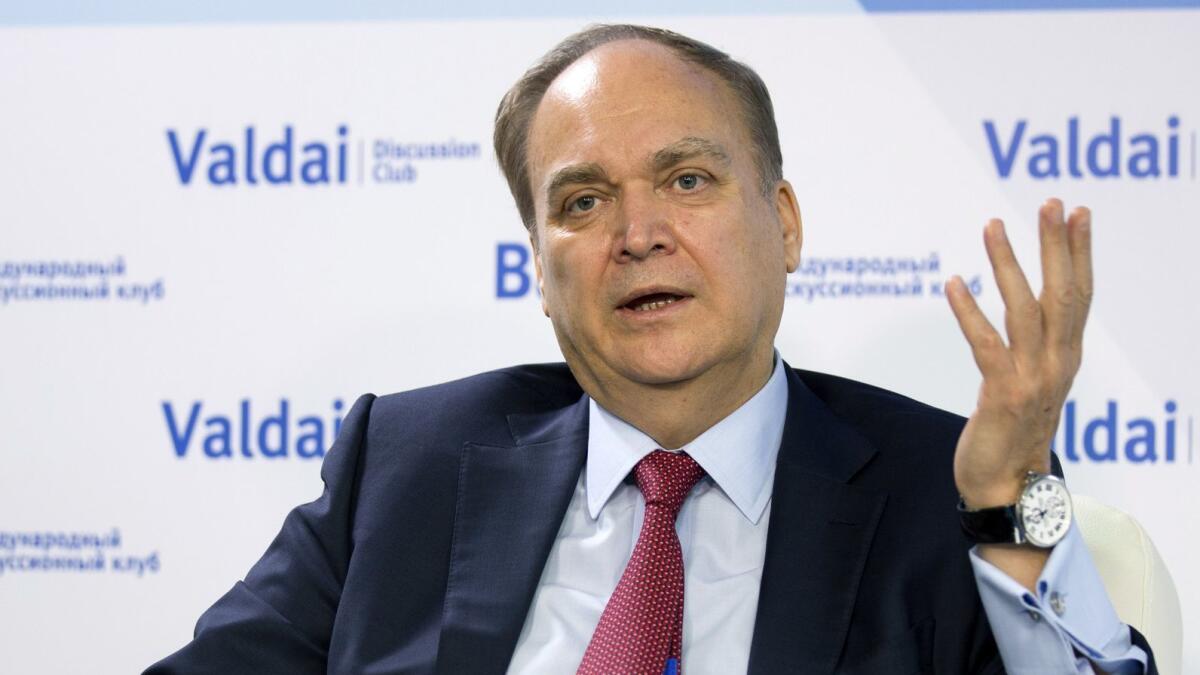Russia’s ambassador to U.S. on Putin-Trump summit: ‘Why do the Western media think it’s bad?’

- Share via
Reporting from Moscow — The Helsinki summit between Presidents Trump and Vladimir Putin was a “key event” in international politics, but Washington and the international media are reluctant to accept that it was a success, Russian’s top envoy to the Unites States said Friday.
“The presidents of two great powers met and talked. Their talks were constructive,” Ambassador Anatoly Antonov said during a news conference in Moscow. “I saw that they spoke with respect, listened to each other. I think they understood each other.
“Why do the Western media think it’s bad?” he asked.
As speculation continues to swirl about what exactly was discussed or agreed upon in the Finnish capital, Antonov offered only a few scant details about what the two presidents discussed behind closed doors Monday. He told reporters that most of the meeting was devoted to Syria and bilateral relations between Washington and Moscow, which included the “well-known concerns” on the American side regarding Russian meddling in the 2016 U.S. presidential election.
The exact details of the meeting’s talks should and will remain, as Antonov put it, “discreet” in order to be effective.
Trump and Putin met alone with only their translators present.
Russia also is open to discussing Trump’s surprise invitation Thursday for Putin to visit the White House this fall, Antonov said.
“The Russian side has always been open to a possible proposal,” Antonov said. “We’re ready for dialogue on this issue. But of course, it’s up to the Kremlin to decide how many summits are needed, and when.”
Trump’s invitation came late Thursday. Earlier that day the president said on Twitter that he “looked forward to our second meeting,” despite criticism by many from both parties in Washington that he failed to stand up to Putin during the first significant meeting between the two presidents since the accusations that the Kremlin interfered in 2016 to help get Trump elected.
Press Secretary Sarah Huckabee Sanders told reporters Thursday that “discussions are already underway” to plan for a possible second meeting.
Antonov confirmed that the Helsinki talks did include a possible “referendum” in eastern Ukraine, where Moscow-backed separatist rebels have been battling with Ukrainian government forces for more than four years. The Russian ambassador declined to say what he meant by referendum, including whether that referred to a measure subject to a vote. But he did say that Putin made it part of “concrete proposals” to Trump on solutions for the conflict.
Maria Zakharova, the spokeswoman for the Russian Foreign Ministry, said later Friday that since the West has failed to force Ukraine to stick to the Minsk peace agreements designed to resolve the conflict in Ukraine, it is possible “to discuss other internal Ukrainian crisis settlement options,” such as a referendum. She was quoted by the Interfax news agency.
At least one of the rebel leaders has denied knowing anything about a referendum. “This information is news to us,” Alexander Kazakov, an advisor to the head of the self-declared, pro-Russia Donetsk People’s Republic, told the Russian news site RBC.
The referendum idea raises many questions, Kazakov told RBC. “Who is going to vote?” he asked, adding that both the Donetsk People’s Republic and the neighboring Luhansk People’s Republic, another pro-Russia region, held referendums on independence from Ukraine in 2014. The referendums passed, but the results were not recognized by Russia or the West.
The presidents also made progress on U.S.-Russian cooperation on Syria’s future, Antonov said, again without providing details.
The Russian ambassador’s harshest comments targeted the backlash in Washington after the Helsinki summit, saying that the event was being held “hostage by the domestic struggles between the Democrats and Republicans.”
“It seems the Russophobia is not going down” in the U.S., Antonov said.
The level of anti-Russia sentiment isn’t likely to go away until after the U.S. midterm election in November, he said. “Perhaps then the situation will calm down a bit,” Antonov said.
The ambassador asserted that the arrest this week of Maria Butina, a gun rights activist accused of being a Kremlin covert agent in the U.S., was another consequence of “Russophobia.”
U.S. prosecutors said Butina, a 29-year-old Russian citizen, was working to infiltrate U.S. political organizations, including the National Rifle Assn., before the 2016 presidential election.
Butina denies the charges. The Russian Foreign Ministry has defended her, even changing its Twitter profile to a picture of Butina.
“It’s a farce what they are doing … a mockery,” Antonov said. “It’s hard to explain what they do in Washington, and why they do it.”
Twitter: @sabraayres
Ayres is a special correspondent.
More to Read
Sign up for Essential California
The most important California stories and recommendations in your inbox every morning.
You may occasionally receive promotional content from the Los Angeles Times.











